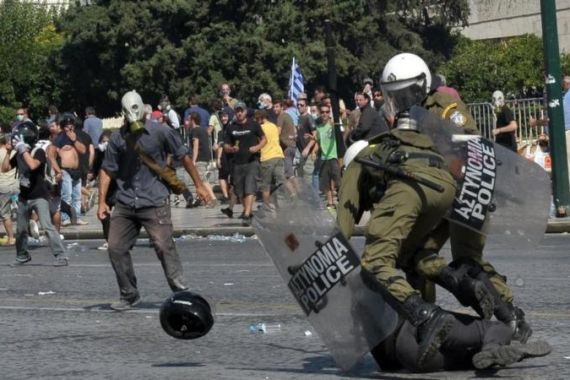Police and protesters clash in Greece
Demonstrations turn violent after thousands of strikers gathered to protest further spending cuts and tax increases.

Police in Athens have clashed with protesters during a nationwide strike in protest at a new round of austerity cuts introduced in return for vital EU-IMF loans.
The protesters threw firebombs, smashed windows and set fire to garbage on the sidelines of the demonstration on Wednesday near luxury hotels on the capital’s central Syntagma square.
Keep reading
list of 4 itemsChina’s economy beats expectations, growing 5.3 percent in first quarter
Inside the pressures facing Quebec’s billion-dollar maple syrup industry
Manipur’s BJP CM inflamed conflict: Assam Rifles report on India violence
The police fired tear gas and stun grenades to disperse a group of around 200 protesters.
Dozens of people were detained, according to a police source, as crowds moved towards the capital’s other central square, Omonia, booing and throwing plastic bottles at the special forces that were present.
The protests rallied striking civil servants and private sector workers as well as students and pensioners, who have all been hit by previous rounds of cutbacks in the debt-laden eurozone country.
Workers walked off their jobs for the first general strike since the country’s coalition government was formed in June, as the prime minister and finance minister worked on a package of 11.5bn euros ($14.87bn) in spending cuts.
The strike halted flights for hours and shut down everything from schools, ferry services and hospitals to shops, petrol stations and customs offices.
Politicians in Athens have struggled to come up with more punishing austerity measures that would be acceptable to its rescue creditors, with disagreements arising between the three parties that make up the coalition government.
Cutting costs
Greece’s creditors have demanded more fiscal reforms if they are to continue handing out rescue loans preventing the country from a messy default that could roil the euro.
The next payment of 31bn euros hinges on the government agreeing the cuts.
Yannis Stournaras, finance minister, and Antonis Samaras, prime minister, agreed on the new 11.5bn euro austerity package for 2013-14, along with another 2bn euros in improved tax collection, a finance ministry official said Wednesday morning.
The latest strike has been called by the country’s two biggest unions, which represent half of Greece’s workforce.
“We call on everyone to take part in the strike and resist the austerity measures that hurt Greek people and the economy,” Despoina Spanou of the ADEDY labour group said.
“This strike is only the beginning in our fight.”
Samaras’ government has enjoyed a relatively quiet period through the summer, but ADEDY and its private-sector counterpart, GSEE, predicted a large turnout for the strike on Wednesday.
About 5,000 police – twice the number usually deployed – are on guard in the centre of Athens as authorities brace for the rioting that has marked past rallies.
Greece last witnessed serious violence in February, when protesters set shops and banks ablaze as parliament approved an austerity bill.
“SOS – save the country, but above all its people,” the leading union confederations the GSEE and ADEDY said in posters strung from lamp-posts across Athens.
“Salaries, pensions and benefits have been cut again and again for 2.5 years and the ‘monster’ of the debt and deficits remains invincible, constantly demanding new sacrifices,” the unions said in a statement.
Late on Tuesday, in a curtain raiser to Wednesday’s standstill, academics protested against salary cuts by forming a symbolic circle around the finance ministry and then marching towards the main University of Athens building.
Workers’ anger
Ships will stay docked, shops will pull down shutters and museums and monuments will be closed to visitors throughout the day on Wednesday. Air traffic controllers will walk off the job for three hours and hospitals will operate on emergency staff.
Much of workers’ anger is directed at spending cuts worth nearly $15.55 billion over the next two years that Greece has promised the European Union and International Monetary Fund in an effort to unlock its next tranche of aid.
The bulk of the cuts are expected to come from cut wages, pensions and welfare benefits.
A survey by the MRB polling agency last week showed that more than 90 per cent of Greeks believe the planned cuts are unfair and burden the poor, with the vast majority expecting more austerity in coming years.
With Greece facing certain bankruptcy and a potential eurozone exit without further aid, Samaras’ government has little choice but to push through the unpopular measures.
Political analyst Panos Polyzoidis in Athens told Al Jazeera that because the ruling three-party coalition enjoys a comfortable majority in government, “they have had an easy first three months” since elections last June.
“They have to introduce a new package of cuts and that will definitely make their lives more difficult [especially] internally because we have begun to see some cracks in the government coalition,” Polyzoidis said.
However, Polyzoidis said, “The leaders of the three parties have no [other] option” than to pass the measures.
Greece is now in its fifth year of recession, with no light at the end of the austerity tunnel.